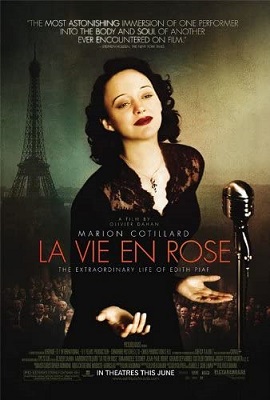
Foremost, this is not a musical. This is a movie about the life of one of the most beloved French singers, Edith Piaf. This movie would have been five stars if it was not for the time frames’ back and forth that felt a bit overwhelming not just for me but for the rest of the viewers who made this same remark when we commented the film afterwards.
Marion Cotillard, rightfully so, won an Oscar for her flawless melodramatic, intense but, nonetheless, vulnerable performance as the Paris’ Sparrow, throughout the several decades of her rather short and tormented life. “Son n’était pas une vie en rose!”
Watching the movie, I could not avoid thinking how primal the Old World still was at the beginning of the XX century. I even remembered how my mother used to say that she would never deliver a baby in Europe after seeing how dirty their hospitals were in comparison to the American standards that were more the norm in our own country.
Detailing here the significant sources of drama that accompanied this woman from birth till death would be to spoil it for those who have not seen this movie just yet. It should suffice to say that I am sure many of us would have not surmounted the cruelty of the circumstances with which she was brought into this world.
But she also was “la Dame de la chanson”. This review would not be complete without discussing her music. From frailty to grandiosity, Piaf left us a collection of music that deeply moves my emotions every time I heard them. My favorites, “Milord”, “Rien de rien”, “Padam Padam”, “Mon Dieu”, “Non, Je Ne Regrette Rien” and, of course, being hers the best interpretation of the French anthem ever, “La Marseillaise” (although in the voice of little Piaf, interpreted by Cassandre Berger and lip-synched by Pauline Burlet) all are present in the movie. “Ne me quitte pas” and “L’ Accordéoniste”, also long time personal favorites, were understandably left out; a movie with all her repertoire would last a day!
A couple interesting facts about Piaf not found in the movie are that she was initially given the motto “La Môme” which is French for “The Kid”. She was the one who took under her wings another of my favorite French singers, Charles Aznavour and made of him an international acclaimed star.
“Marchons! Marchons!”
From Wikipedia: “Although she was denied a funeral mass by the Roman Catholic archbishop of Paris because of her lifestyle, her funeral procession drew tens of thousands of mourners onto the streets of Paris and the ceremony at the cemetery was attended by more than 100,000 fans. Charles Aznavour recalled that Piaf’s funeral procession was the only time since the end of World War II that he saw Parisian traffic come to a complete stop.”

